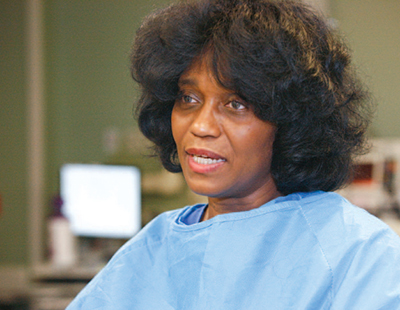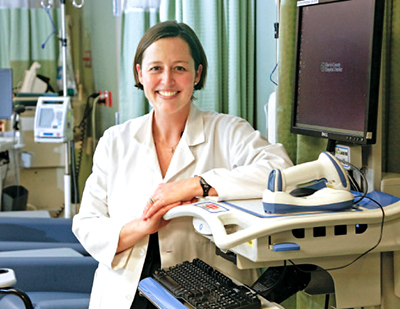
Since 1995, MD Anderson faculty and fellows have provided innovative and multidisciplinary cancer care for thousands of patients at Lyndon B. Johnson General Hospital at no expense to Harris County. Here's a closer look at just a few of the dedicated members of the health care team.
Meet Lois Ramondetta, M.D.
There is a thick scrapbook of photos near the LBJ desk of Lois Ramondetta, M.D., packed with wedding, vacation and baby photos, as well as pictures of smiling women, some bald from chemotherapy.
The photos remind Ramondetta of the hundreds of women who have walked into the gynecologic oncology clinic at LBJ — and into her life.
Every weekday, Ramondetta, professor in MD Anderson’s Department of Gynecologic Oncology and Reproductive Medicine, is at LBJ and MD Anderson, driving the 20 minutes each way to round, perform surgery or see patients in clinic.
She started the gynecologic oncology clinic at LBJ in 2000 when she completed her MD Anderson fellowship. In addition to LBJ residents, she also works with Memorial Hermann residents and MD Anderson gynecologic oncology fellows. Two of her MD Anderson colleagues oversee the colposcopy service.
“Seeing patients at LBJ is not for everyone, and, for me, the key has been our great team,” she says. “We’ve shared so much grief and happiness over the years.”
Ramondetta sees every new patient diagnosed with a gynecologic cancer. In the last year, she’s worked closely with an HCHD navigator to assist patients diagnosed with cervical cancer so they can maximize resources and services.
In addition, she's earned her certificate in palliative care to better care for patients at the end of life and see to their families’ many needs.
“Working at LBJ is very rewarding. Our patients are grateful for all that you do as a physician or advocate,” she says. “We make an impact here. There are lots of smiles and hugs.”
The Privilege Is in the Service
Meet Cynthia Greene, R.N.
A great nurse is vital in a cancer patient’s journey.

For the MD Anderson team, Cynthia Greene, clinical nurse, has been a valued constant since 1995 when the new oncology service was launched.
Employed by HCHD, she has always been in infusion therapy, giving chemotherapy and other treatments. She has worked with every MD Anderson fellow, faculty member and employee who has cared for cancer patients at LBJ.
A native of Mississippi, Greene earned a history degree from Tufts University and then decided to pursue a career in nursing, instead of teaching. She graduated as a licensed vocational nurse in 1977 and, 10 years later, received her bachelor’s degree in nursing from The University of Texas School of Nursing. Part of her education included an MD Anderson rotation.
“I can identify with the patients I care for, and I can relate to their needs,” she says. “We’re challenged in some ways, but our patients get some of the best cancer care in the world.”
When Greene began working in the Infusion Center at LBJ, she was the only nurse caring for patients in a cramped space of three converted inpatient rooms with three beds and six chairs. Last October, the new center opened with 20 chairs, each surrounded by pastel privacy curtains. The sage green walls are accented with colorful art and soft lighting.
“I love this new center for our patients,” she says. “It’s what I’ve always wanted for them. It’s what they deserve.”
Meet Alyssa Rieber, M.D.
LBJ’s Chief of Medical Oncology Alyssa Rieber, M.D., rounds with fellows from MD Anderson and residents from UT Health, checking on cancer patients who are hospitalized with a variety of complications and side effects.

With every patient, she asks a number of questions: “How are you feeling?” “Do you have pain?” “What medications are you taking?” “How long have you been on treatment?” “Did you have your chest X-ray?” “Do you feel ready to go home?”
The clinical questions immediately have follow-up questions that a social worker might ask: “Who do you live with?” “Who is your caregiver?” “Do you have transportation?” “Who’s caring for your children?” “Are you on disability?”
For Rieber, who completed her fellowship at LBJ in 2007 and stayed on as a dedicated faculty member, both sets of questions are equally important.
“You have to want to be at LBJ and advocate for patients who really need you. Everything you do for them is magnified in importance,” she says. “It’s vital to ask questions that you may not learn in medical school, but that you learn on the job here. You have to know the patient’s situation. If you order the best diagnostic test or radiation treatment in the world and they don’t have transportation, it’s not going to help. You have to find what works best for their disease — and their situation.”
Rieber’s dedication to cancer patients began in her first year of medical school when she was diagnosed with Hodgkin’s lymphoma. As a cancer survivor and senior member of the oncology team, Rieber runs the survivorship clinic once a week, in addition to her other duties. The survivorship clinic at LBJ is the first of its kind in a county hospital.














